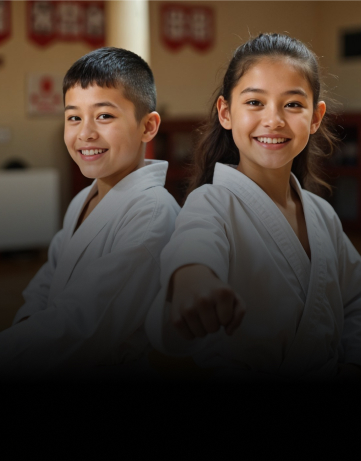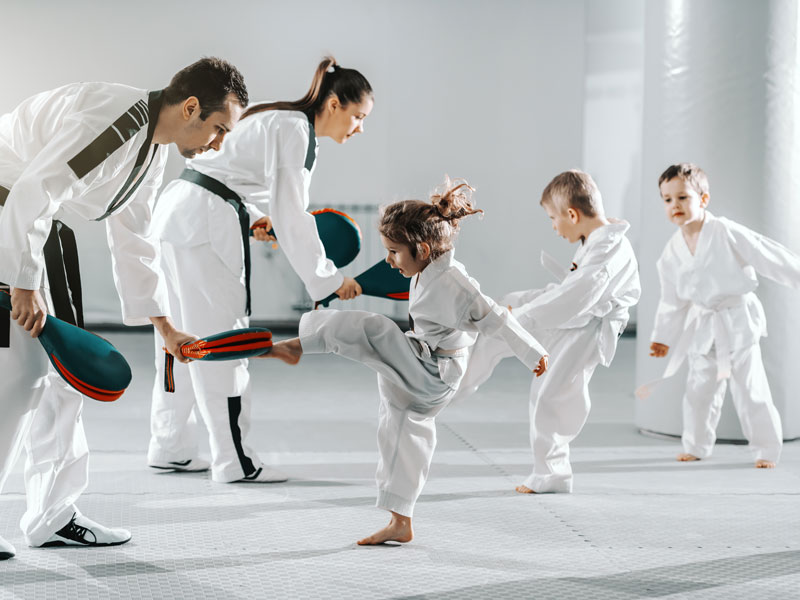Karate for kids – Inspire Your Child Through Traditional Martial Arts
Wiki Article
How Karate for Kids Can Boost Self-confidence and Discipline in Youthful Martial Artists
Karate for youngsters provides a distinct chance to build self-confidence and self-control in young martial artists. As they find out new techniques and face obstacles, they not just acquire skills but additionally create a strong sense of self-regard. This organized environment urges them to appreciate the trip of improvement. Just how does this training translate into their daily lives? Discover the deeper connections that make karate greater than simply a sporting activity.The Significance of Self-confidence in Childhood Advancement
Self-confidence is a necessary foundation in childhood development. When you support your youngster's self-confidence, you equip them to encounter difficulties, take threats, and express themselves easily. Children with confidence are extra happy to check out new activities and social situations, which can lead to long lasting friendships and important experiences.Encouraging your kid to get out of their comfort zone fosters resilience. They learn that failure isn't the end yet instead a tipping rock to success. By commemorating their success, despite how little, you assist them identify their abilities and worth.In this trip, assistance and favorable reinforcement from you play a crucial duty. Whether it's through praise or just existing, your participation increases their self-confidence. As they grow, this self-assurance comes to be a long-lasting property, equipping them to navigate both obstacles and opportunities with a solid feeling of self.Just How Karate Educates Self-control and Emphasis
Karate helps you develop discipline and emphasis via its organized training program. As you exercise mindfulness during each session, you'll learn to concentrate much better both on and off the floor covering. Plus, setting and attaining goals in martial arts strengthens your capacity to stay dedicated and attentive.Structured Training Routine
While you engage in karate training, you'll swiftly uncover exactly how a structured regimen infuses self-control and emphasis in young professionals. Each class follows a details style, consisting of warm-ups, method method, and sparring. This consistency educates you to devote and appreciate the procedure to enhancement. As you learn methods and kinds, you establish a feeling of obligation for your own progress.The structured setting motivates you to set goals, whether understanding a brand-new belt or refining a kata. You'll find that staying focused throughout courses and drills sharpens your concentration. The self-control you grow in martial arts extends beyond the dojo, positively affecting your schoolwork and day-to-day regimens. Each session strengthens the relevance of commitment, assisting you turn into a more regimented person.Mindfulness in Method
As you exercise martial arts, you'll discover that mindfulness comes to be a necessary component of your training. Each move requires your full interest, aiding you stay concentrated on the present moment. You'll find out to disregard interruptions and focus on your breathing, movements, and objectives. This increased recognition sharpens your reflexes and enhances your discipline.During sparring or kinds, you'll find the relevance of being psychologically existing - Karate Salisbury MD. You'll see how this focus not only enhances your technique yet additionally constructs your self-confidence. By exercising mindfulness in martial arts, you grow perseverance and strength, vital qualities that expand past the dojo. This way, karate instructs you to harness your mind, helping you create a self-displined strategy to difficulties both on and off the mat
Personal Goal Setting Techniques
Establishing objectives in karate isn't practically gaining belts; it's an effective method to grow self-control and emphasis. When you set particular, achievable targets, you develop a roadmap for your development. Rather of simply aiming to enhance your kicks, attempt focusing on understanding a certain method each month. This technique keeps you inspired and engaged.Breaking down larger objectives into smaller sized, manageable actions assists you track your development and celebrate small victories in the process. Whether it's refining your stance or increasing your sparring endurance, every objective enhances your dedication. As you accomplish these goals, you'll build self-confidence in your abilities and establish a strong sense of technique that expands past the dojo right into day-to-day life.Structure Resilience Through Martial Arts
Martial arts, particularly karate, uses children an one-of-a-kind possibility to build resilience in a helpful environment. In classes, they deal with difficulties that press their limitations, whether it's understanding a brand-new technique or competing with a partner. Each obstacle, like a missed kick or a shed suit, comes to be a chance to find out and grow.As they exercise, youngsters discover to accept discomfort and maintain trying, even when things get tough. They find that failing isn't the end; it becomes part of the trip. This mindset assists them recover stronger, not simply in the dojo, however in daily life.With each difficulty they overcome, your youngster develops confidence in their capacity to take on barriers, sustaining their decision. With karate, they'll comprehend that durability isn't nearly physical strength; it has to do with mental grit and perseverance, encouraging them to face whatever life tosses their means.The Role of Respect in Karate Training
Respect is a fundamental concept in karate training, promoting a culture of technique and sociability among trainees. When you step onto the dojo flooring, you're not simply finding out methods; you're additionally learning to appreciate your instructors, peers, and the art itself (Karate Salisbury MD). Bowing at the start and end of course isn't simply basics a procedure; it symbolizes nfl playoffs your acknowledgment of others' dedication.as and efforts you develop mutual respect, you'll find it enhances your knowing experience. You'll listen much more diligently to your teacher and gain understandings from fellow pupils. This setting motivates useful objection and assistance, permitting every person to expand together.Moreover, regard grows self-control. Recognizing the value of effort and humility helps you stay concentrated on your training. Subsequently, this regard converts right into your everyday life, improving your interactions and connections outside the dojo. With martial arts, you find out that regard is important for individual development and neighborhood structureEstablishing Objectives and Accomplishing Success in Karate

Social Skills and Teamwork in the Dojo
While training in the dojo, youngsters normally establish vital social abilities and synergy abilities. As they practice together with peers, they discover to connect effectively, share space, and support one an additional. Each course provides possibilities for cooperation, whether it's throughout companion drills or team exercises. This synergy fosters relationships and creates a sense of belonging, making the dojo a nurturing environment.Kids also acquire valuable conflict resolution abilities. When they run into obstacles, such as differences during sparring, they find out to navigate these situations constructively. They exercise patience and compassion, comprehending that everyone has various staminas and weaknesses.Moreover, joining team activities grows a sense of accountability. You'll see your youngster learning to count on teammates and take duty for their function in a team. These experiences not only enhance their fighting styles journey yet also outfit them with social tools they'll lug into various other locations of life.
The Long-Term Conveniences of Karate Beyond Childhood
As kids grow up and move into their adult years, the advantages of martial arts prolong much beyond the dojo. You'll find that the discipline and focus learned via martial arts can convert right into your expert and scholastic life. Setting and accomplishing goals in martial arts promotes a strong job values, which can press you to master any kind of endeavor.Moreover, the self-confidence gained from understanding methods and sparring can enhance your self-esteem, helping you take on obstacles head-on. This strength becomes very useful as you encounter the unpredictabilities of adulthood.Additionally, the social skills developed through team effort and friendship in here are the findings the dojo can cause far better connections in both personal and professional rounds. You'll discover to connect efficiently, willpower problems, and construct an encouraging network.Ultimately, karate forms not simply competent martial artists, however all-round people all set to tackle the globe.Frequently Asked Concerns
What Age Is Finest to Begin Martial Arts for Kids?
You can begin martial arts as very early as age 4 or 5, yet it usually relies on your youngster's maturity and rate of interest. Locating a class that matches their age and power degree makes a big difference.Are There Any Kind Of Wellness Conveniences From Practicing Karate?
Yes, exercising karate deals various wellness advantages. You'll enhance your coordination, strength, and versatility while improving cardio physical fitness. And also, it boosts focus and psychological health, making it an amazing option for overall physical and psychological wellness.Exactly How Often Should Youngsters Go To Karate Courses?
You need to motivate your children to attend karate classes at least two to three times a week. Uniformity assists them discover strategies properly and create skills, making their experience more enjoyable and gratifying in the lengthy run.Can Karate Aid With Managing Anxiety in Children?
Yes, martial arts can help take care of anxiousness in children. It shows focus and self-control while supplying a risk-free outlet for power. You'll observe your child expanding more confident and tranquil as they exercise regularly.What Equipment Is Required for Kids Beginning Martial Arts?

Report this wiki page